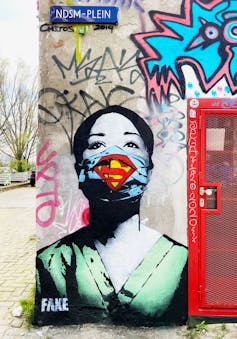The fighting hero syndrome: beware of the fall!
COVID-19 arrived in France in a severely deteriorated hospital environment where working conditions are extremely difficult and where the feeling of lack of recognition from citizens and, even more so, from public authorities is becoming increasingly prevalent.
Florence Nande, University of Montpellier and Marie-Laure Weber, University of Montpellier

All of this contributes to a growing unease among healthcare workers. And yet, in the face of this unprecedented health crisis, hospital staff are standing strong and mobilizing on the ground, day after day, in the service of the entire nation.
We are rediscovering these women and men who are fighting at their own risk for others: yesterday's forgotten heroes are becoming today's heroes. They are the subject of numerous tributes, not only from anonymous French citizens, but also from the highest levels of government. The very martial speech by the President of the Republic on March 16 ("We are at war"), announcing the start of widespread lockdown of the population, catapulted healthcare workers into the role of heroic combatants. At the height of the health crisis, every evening at 8 p.m., the French applauded them from their windows, a sign of recognition for these admirable workers in the shadows. And every day, the media also relayed messages of support from the entire population.
Loss of psychological resources
However, taking on the role of heroic fighter can prove dangerous for these healthcare workers in both the short and long term. They experience extremely stressful situations on a daily basis and are already weakened by past struggles. Their anger at the lack of resources has not been heard by the authorities, as evidenced by the protests by hospital staff at the end of 2019.

Street Art News
The warrior hero in mythology is a superman, a demigod who stands out for his exploits, his extraordinary courage, his great self-sacrifice, and his sense of duty; he goes into battle and suffers in silence without asking for help.
Although medical professionals demonstrate self-sacrifice and courage, their daily lives are also marked by fear for themselves and their families, stress caused by shortages of protective equipment, the brutality of this disease, which is leading to an exponential increase in the number of patients and daily reorganizations, the fear of having to make choices that go against their values, incivility and violence from some members of the public, and fatigue that builds up in a daily routine that has become extremely stressful. All of this contributes to the depletion of their psychological resources.
This approach of the fighting hero may seem rewarding and encouraging in the short term, but without strong support and additional resources, it risks failing to compensate for the loss of personal resources that these extreme circumstances cause, with short- and long-term consequences for the psychological health of caregivers.
Hobfoll's (1989) Conservation of Resources (COR) theory provides an insightful interpretation of this situation. It suggests that individuals continually strive to obtain, conserve, protect, and nurture the resources that are important to them (e.g., health, family, etc.). Stress occurs when these resources are threatened or actually lost, or when events prevent individuals from gaining new resources despite significant personal effort.
The availability of and access to these resources enable individuals to achieve or maintain their goals. Situations that undermine access to these resources generate stress and can have longer-term consequences for individuals' psychological health. It is therefore important to put in place conditions that enable medical professionals to protect and replenish their reservoir of resources, conditions that Hobfoll calls resource caravan passageways.
When individuals live in enriched and stable environments, they have fertile ground for developing richer networks of resources and maintaining their "resource caravans" (in other words, their reservoir of resources); whereas in harmful circumstances, individuals may struggle or fail to develop or maintain them.
Recognition is not enough
According to this theory, there is therefore a high risk among these caregivers, who are experiencing an unprecedented situation in which their core resources (health, family, meaning of life) are constantly under threat, of developing chronic stress that could have consequences for their health. In this case, the resource of "recognition" alone is not a weapon of resistance against stress. It will enable them to cope in the short term, but it will not be enough if it is not accompanied by other material, financial, and human resources that would compensate for the loss of resources experienced by our caregivers.
This is all the more significant given that, as a result of chronic stress, people tend to see their pool of resources becoming increasingly depleted and will be more vulnerable to future losses. Hobfoll emphasizes the primacy of loss: individuals overemphasize the loss of resources and underemphasize gains. In other words, each individual has a sensitivity to loss, meaning that emotional responses are more pronounced during negative experiences than positive ones. It is therefore important to put in place sustainable conditions to maintain a level of available resources, at the risk of seeing increased discomfort at work when the spotlight is no longer on these professions.
The massive investment plan for hospitals and career advancement announced at the height of the crisis on March 25 by the President of the Republic must therefore establish sustainable conditions that provide, enrich, and protect the resources of healthcare workers. This could be the beginning of a response to the appeal made by neurologist François Salachas last February, which went viral: "You can count on me, the opposite remains to be proven..."![]()
Florence Nande, Temporary Teaching and Research Assistant Research ATER) – MRM Laboratory and IUT of Nîmes, University of Montpellier and Marie-Laure Weber, PhD student in Management Sciences, MRM Laboratory, University of Montpellier
This article is republished from The Conversation under a Creative Commons license. Readthe original article.